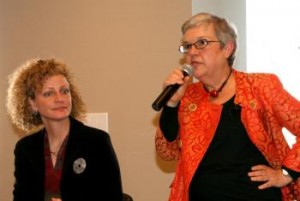Raising the Youth Voice on Population and Reproductive Rights
Jun 19th, 2012 | By admin | Category: Rio+20 Earth SummitBy Suzanne York, HowMany.org
Rio de Janeiro — Nearly half of the world´s population is under the age of 25, or more than 3 billion people. In some areas of the world, young women (ages 15-19) are twice as likely to lack access to contraceptives they desire as women over the age of twenty. As policy-makers hammer out a final text at the UN Rio+20 Earth Summit, youth activists from around the world are raising their voices and participation levels in an attempt to shape global policies affecting the sexual and reproductive rights of youth.
At an official side event on youth sexual and reproductive health and rights (SRHR), panelists from all over the world spoke of the need to get a rights-based perspective to SRHR into the discussion on sustainable development. In particular the panel emphasized gender inequalities and what sustainable development actually means to young women and girls.
A report of the state of the Rio+20 text prefaced the panel, where it was noted that reproductive rights has been taken out of the draft text, as has the word adolescent. It is critical that SRHR in included in the final language to ensure that women have access to reproductive health services. A call to pressure government delegations to put this back in was demanded.
Esther Agbarakwe, an international fellow with Population Action International who is Nigeria, noted how the issue of SRHR has been very contentious within the UN (and elsewhere) and that supporters of family planning services and women´s health must keep pushing for this. And, she said, “there can´t be sustainable development without gender equality.” She acknowledged that there is a long way to go still, but there is hope because young people are very interested in pushing for greater rights.
This point was reiterated by Leo Christian Lauzon who is with Advocates for Youth and comes from the Phillipines. Leo urged that we need to get our voices out there and heard on SRHR and family planning and most importantly, translate this into action and youth participation.
Marilia Moschkovich, a Brazilian writer and blogger, said we can´t even think about sustainable development without including family planning.
Just prior to this event, a group of us visited a favela family planning clinic and resource center where International Planned Parenthood Federation (IPPF) organized a meeting with youth peer reproductive health activists. Carmen Barroso, Regional Director for IPPF/Western Hemisphere Region, was fielding questions from international activists and others on the experiences of Brazilian youth. She said that Brazil, despite making enormous gains in voluntary reduction of its fertility rate, had not made much progress with its young people, where fertility rates are still high. One young man commented on how gender inequality starts with access to contraceptives, or how it is easier to get condoms than birth control pills. When asked if youth could talk to their parents about sex, these Brazilian adolescents, like most of their peers around the world, said they weren´t comfortable talking with their parents and relied on friends. One commented on facing a lot of peer pressure at schoool to have sex.
Our time spent with these youth was short. Another young woman said she became part of this peer reproductive health group after a family member became pregnant and that motivated her involvement, while a different woman stated she joined out of curiosity and to be better informed.
Earlier, Barroso had stated that “sustainable development isn´t sustainable if it doesn´t empower women and young people to control their own bodies, educate themselves and have a voice in government at all levels.”
Suzanne York is Senior Writer for Institute for Population Studies (IPS) / HowMany.org and is reporting from Rio+20

